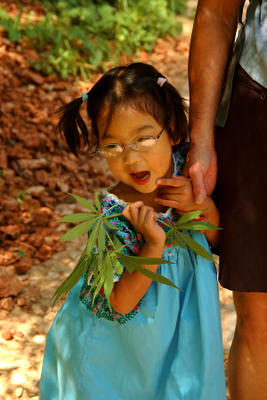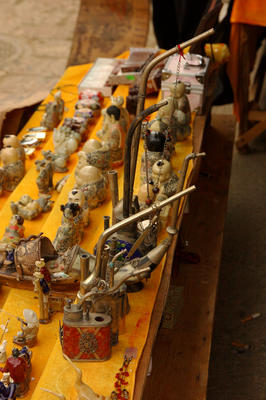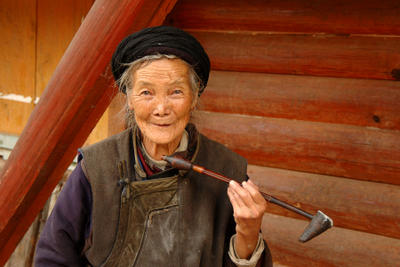Put That In Your Pipe...
28 September 2005

Don’t worry Division of Family Services watchdogs, neither Bei nor her parents have succumbed to reefer madness. Yet. But this parent admits that the vision of a mellow Bei, giggling quietly in her room with a can of Pringles, listening to kid’s songs at full volume on our IPOD or puzzling delightedly through an audio recording of Yurtle the Turtle has some appeal. How much harm could it do??
And for you old time climbers out there, this shot taken along the trail at the local Lijiang climbing area might get your attention. It’s a wonder that anyone managed to find the ambition to actually drill 6 difficult climbing routes here. Or maybe this explains why there are only 6 routes in all of Lijiang despite the limitless limestone.

So in case you haven’t figured it out, Cannabis grows wild in the Yunnan Province although few, except foreign English teachers, seem to pay much attention to it. In Liming (see earlier post) we saw lots of cute and wizened old women happily puffing away on their pipes, and in the markets of Lijiang pipes and hukas are not rare, although cigarette smoking (tobacco) through enormous bongs is a common sight on the streets and may explain some of the paraphernalia.

Remember this happy lady from Liming??

And do you recall this "psycho bride" in an August post from Shanghai? Perhaps her bachelorette party included a trip to Yunnan.

I’ve asked a few people about the legality of cannabis in Yunnan, and I’m told that it is illegal but only if one is a dealer. And in that case, the consequences are dire. A horrifying bit of news from a web report by Kevin Nelson (Alternet.org) reports that on June 26, 2002:
“China marks a U.N. international anti-drug day by holding rallies where piles of narcotics are burned, and 60 people are executed for drug offenses. Chinese authorities have executed hundreds of people since April in a crime crackdown labeled "Strike Hard" that allows for speeded up trials and broader use of the death penalty."
"Thousands of people attend a rally at a stadium in Kunming, capital of southwestern Yunnan province, where 20 suspected drug traffickers are sentenced to death, then executed at a separate location, with a bullet to the back of the head.”
Yikes.
A more thorough report by Robert C. Harp of the International Hemp Association (The Netherlands) suggests that:
“...there is very little consumption of Cannabis products for recreational purposes by either resident Chinese or visitors. Despite these facts, the Yunnan provincial government has instigated policies that confuse drug Cannabis ("marijuana") with industrial hemp. Since the spring of 1998, the growing of Cannabis for any reason has been prohibited, although Cannabis still flourishes in most parts of Yunnan. Confusion continues.”
Reading further:
“There is only one location in Yunnan where Cannabis is used in a drug-related context. Feral Cannabis grows abundantly throughout the hills above Dali town, a popular tourist destination in western Yunnan. During the early 1990s, when the first backpacker tourists on the Dali-Lijiang-Tiger Leaping Gorge route saw feral hemp growing, they harvested small amounts, which they dried and smoked. The local Bai minority market women soon realized that they could harvest as much as they wanted of the naturally growing "marijuana" in the autumn and sell it to tourists all year long. The Dali Bai have no tradition of recreational Cannabis consumption and they do not have a recent history of hemp cultivation, although they were active opium producers before the founding of Modern China. The Bai market women also sell "hemp" clothing to tourists which is made from cloth imported from the commercial hemp producing areas of Yunnan and other provinces. Although hemp is not a traditional part of their culture, they realize that hemp sales are good business, as is selling "marijuana" to tourists. Small amounts of dried Dali Cannabis leaf and flowers are occasionally taken to Kunming and other areas of Yunnan by tourists, where they smoke it.
Eventually, Dali gained an obscure international reputation as a source of marijuana. Both High Times (1994) and Cannabis Culture (1999), recreational Cannabis magazines, spread the image of Dali as an attractive tourist destination for Cannabis smokers. In actuality, Dali and other feral Yunnan Cannabis contains very little psychoactive THC (less than 2% dry weight) and so is of very low potency compared to Western drug (2-25% THC) Cannabis (Clarke 1998). The perceived "high" of feral Yunnan hemp is induced more by wishful anticipation, combined with an exotic Chinese set and setting, than by its actual potency. It is truly a pity that misled Western travelers couldn't have enjoyed writing about one of their more characteristically Chinese experiences, rather than misinterpreting both Cannabis botany and Chinese culture.
Tourism is among Yunnan's most important and fastest growing industries, and Dali is one of Yunnan's most popular tourist destinations. Arresting tourists for marijuana possession would not assist Yunnan Province to bolster tourism. It will be interesting to see how the Dali situation is handled.”
So there you have it. I imagine that with time the novelty of seeing lush marijuana plants growing on the College campus or along sidewalks right in downtown Lijiang will wear off, but for now it still turns the heads of us westerners.
BEI! turn down the IPOD! You'll ruin your ears!


Don’t worry Division of Family Services watchdogs, neither Bei nor her parents have succumbed to reefer madness. Yet. But this parent admits that the vision of a mellow Bei, giggling quietly in her room with a can of Pringles, listening to kid’s songs at full volume on our IPOD or puzzling delightedly through an audio recording of Yurtle the Turtle has some appeal. How much harm could it do??
And for you old time climbers out there, this shot taken along the trail at the local Lijiang climbing area might get your attention. It’s a wonder that anyone managed to find the ambition to actually drill 6 difficult climbing routes here. Or maybe this explains why there are only 6 routes in all of Lijiang despite the limitless limestone.

So in case you haven’t figured it out, Cannabis grows wild in the Yunnan Province although few, except foreign English teachers, seem to pay much attention to it. In Liming (see earlier post) we saw lots of cute and wizened old women happily puffing away on their pipes, and in the markets of Lijiang pipes and hukas are not rare, although cigarette smoking (tobacco) through enormous bongs is a common sight on the streets and may explain some of the paraphernalia.

Remember this happy lady from Liming??

And do you recall this "psycho bride" in an August post from Shanghai? Perhaps her bachelorette party included a trip to Yunnan.

I’ve asked a few people about the legality of cannabis in Yunnan, and I’m told that it is illegal but only if one is a dealer. And in that case, the consequences are dire. A horrifying bit of news from a web report by Kevin Nelson (Alternet.org) reports that on June 26, 2002:
“China marks a U.N. international anti-drug day by holding rallies where piles of narcotics are burned, and 60 people are executed for drug offenses. Chinese authorities have executed hundreds of people since April in a crime crackdown labeled "Strike Hard" that allows for speeded up trials and broader use of the death penalty."
"Thousands of people attend a rally at a stadium in Kunming, capital of southwestern Yunnan province, where 20 suspected drug traffickers are sentenced to death, then executed at a separate location, with a bullet to the back of the head.”
Yikes.
A more thorough report by Robert C. Harp of the International Hemp Association (The Netherlands) suggests that:
“...there is very little consumption of Cannabis products for recreational purposes by either resident Chinese or visitors. Despite these facts, the Yunnan provincial government has instigated policies that confuse drug Cannabis ("marijuana") with industrial hemp. Since the spring of 1998, the growing of Cannabis for any reason has been prohibited, although Cannabis still flourishes in most parts of Yunnan. Confusion continues.”
Reading further:
“There is only one location in Yunnan where Cannabis is used in a drug-related context. Feral Cannabis grows abundantly throughout the hills above Dali town, a popular tourist destination in western Yunnan. During the early 1990s, when the first backpacker tourists on the Dali-Lijiang-Tiger Leaping Gorge route saw feral hemp growing, they harvested small amounts, which they dried and smoked. The local Bai minority market women soon realized that they could harvest as much as they wanted of the naturally growing "marijuana" in the autumn and sell it to tourists all year long. The Dali Bai have no tradition of recreational Cannabis consumption and they do not have a recent history of hemp cultivation, although they were active opium producers before the founding of Modern China. The Bai market women also sell "hemp" clothing to tourists which is made from cloth imported from the commercial hemp producing areas of Yunnan and other provinces. Although hemp is not a traditional part of their culture, they realize that hemp sales are good business, as is selling "marijuana" to tourists. Small amounts of dried Dali Cannabis leaf and flowers are occasionally taken to Kunming and other areas of Yunnan by tourists, where they smoke it.
Eventually, Dali gained an obscure international reputation as a source of marijuana. Both High Times (1994) and Cannabis Culture (1999), recreational Cannabis magazines, spread the image of Dali as an attractive tourist destination for Cannabis smokers. In actuality, Dali and other feral Yunnan Cannabis contains very little psychoactive THC (less than 2% dry weight) and so is of very low potency compared to Western drug (2-25% THC) Cannabis (Clarke 1998). The perceived "high" of feral Yunnan hemp is induced more by wishful anticipation, combined with an exotic Chinese set and setting, than by its actual potency. It is truly a pity that misled Western travelers couldn't have enjoyed writing about one of their more characteristically Chinese experiences, rather than misinterpreting both Cannabis botany and Chinese culture.
Tourism is among Yunnan's most important and fastest growing industries, and Dali is one of Yunnan's most popular tourist destinations. Arresting tourists for marijuana possession would not assist Yunnan Province to bolster tourism. It will be interesting to see how the Dali situation is handled.”
So there you have it. I imagine that with time the novelty of seeing lush marijuana plants growing on the College campus or along sidewalks right in downtown Lijiang will wear off, but for now it still turns the heads of us westerners.
BEI! turn down the IPOD! You'll ruin your ears!


0 Comments:
Post a Comment
<< Home